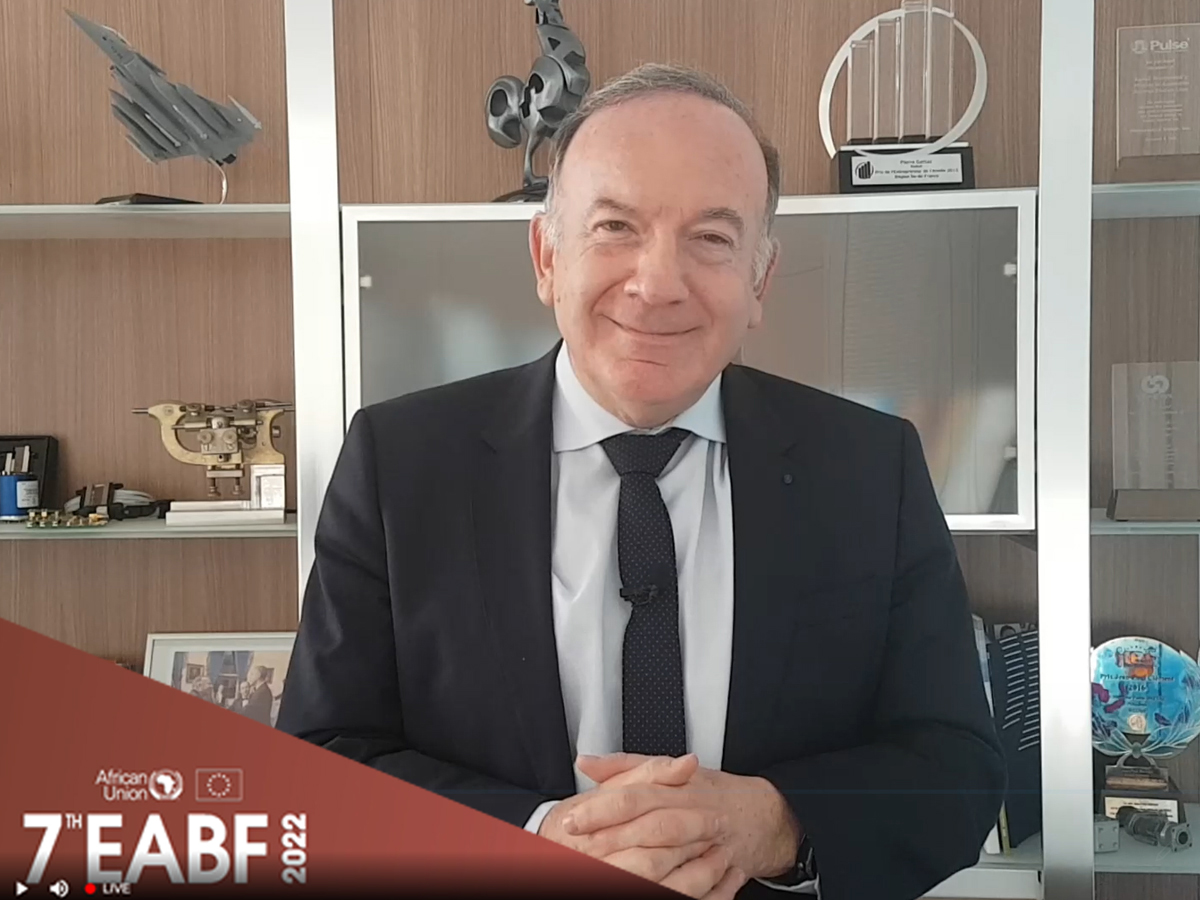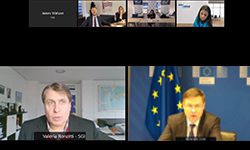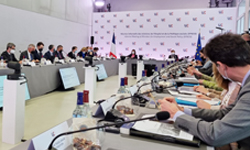BusinessEurope Headlines No. 2022-05
EU-Africa Business Forum: deepening partnership between continents

“The programme of this forum is the result of an unprecedented level of cooperation between European and African business organisations”, said BusinessEurope President Pierre Gattaz in a video intervention at the opening of the EU-Africa Business Forum on 16 February. He highlighted that this edition of the forum was taking place against the backdrop of unparalleled challenges caused by the COVID-19. However, these ongoing challenges had also created opportunities. For instance, it accelerated the digital transformation of our economies, making it easier for SMEs in Africa and Europe to trade with each other. In addition, supply chain disruptions have driven some European companies to seek ways to diversify their sources of supply to reduce future risks. “For its proximity to Europe, Africa is a natural choice”, he concluded. Read the text of the message, watch it, and have a look at the EABF business declaration.
![]() Contact: Benedikt Wiedenhofer
Contact: Benedikt Wiedenhofer
The importance of bilateral trade negotiations
![]() the_importance_of_bilateral_trade_negotiations
the_importance_of_bilateral_trade_negotiations
EU unilateral measures to restore the level playing field must go hand-in-hand with an ambitious trade negotiating agenda. BusinessEurope Deputy Director General Luisa Santos explains why.
The future of Europe’s mobility ecosystem at stake
By Steffen Engling, Adviser for Climate Policy
 Next week (21-22 February) EU transport ministers will gather for the first time under the French Presidency of the Council of the EU in Le Bourget, France, for their informal council meeting. The session comes at a crucial time for the future of mobility in Europe – ministers will likely seek to make headway on the crucial mobility aspects of the Fit-for-55 package.
Next week (21-22 February) EU transport ministers will gather for the first time under the French Presidency of the Council of the EU in Le Bourget, France, for their informal council meeting. The session comes at a crucial time for the future of mobility in Europe – ministers will likely seek to make headway on the crucial mobility aspects of the Fit-for-55 package.
The package marks the beginning of a new era in transport decarbonisation. While the sector had been among the few to actually increase GHG emissions from 2013 until the start of the COVID-19 pandemic, the measures currently under debate seek to drastically curb emissions over the long term.
Investment
This comes with some inherent challenges. First among them, studies (1 2) have found that while technologies in other sectors like power production have developed sufficiently to shrink the cost gap between conventional processes and less-carbon intensive alternatives, that gap remains fairly large when it comes to transport and mobility. These larger abatement costs means that there will be more drastic economic and social consequences originating from the shift in mobility, when compared to other sectors. It also means that there is a particular need for funding to support that shift. According to Bruegel, investments in transport will have to make up the lion’s share of green funding in the 2020s at around € 620 billion/year.
While the European Commission is seeking stakeholder input on the green transition of the mobility ecosystem, it is worrying that at least from what is currently known, the transition pathway will make use of different existing programmes instead of urgently needed additional funding.
Policy challenges
Given these particular challenges and the costs involved, it is important that the ambitious goals for transport contained in the Fit-for-55 package are implemented in the most pragmatic way possible, to ease the burden on the sector as well as on consumers. Transport ministers will discuss three files in particular:
- new rules for alternative fuel infrastructure, known as AFIR;
- ReFuel EU, which aims to increase the use of sustainable fuels in aviation; and
- Fuel EU, which sets emission efficiency standards for maritime transport.
On AFIR, it is essential that the provision of infrastructure points (i.e. electric charging points, hydrogen and natural gas fuelling stations) is at a pace that enables reductions in vehicle emissions provisioned in the eventual regulation on CO2 performance standards. In our estimate, countries have to go beyond the Commission proposal in terms of targets to ensure that Europeans can rely on comprehensive network of infrastructure points and will not suffer from range anxiety. Furthermore, it is necessary that targets for all types of alternative fuels are set in a consistent manner (meaning fleet-based targets for hydrogen, for example). Maybe the most important addition to be made to the Commission proposal is a greater focus on enforcement of the national targets: today 70% of charging points are concentrated in just 3 countries (NL, DE, FR) – this imbalance must be addressed, and Member States must be held to account.
Concerning aviation and ReFuelEU it must be ensured that market for sustainable aviation fuel (SAF) is developed as quickly as possible – therefore we are supporting slightly higher blending obligations in the short and medium term. On the other hand – until the market is mature, fuel suppliers should be able to make use of the flexibility to average out the SAF share in all their fuel deliveries. To encourage higher SAF production, tools such as carbon contracts for difference must be considered.
On maritime shipping (FuelEU), the well-to-wake emission intensity standard is the right approach to encourage emission savings. However, the assumed standard values should be revised in order to recognise alternative production pathways for fuels as well as increasingly efficient propulsion technologies. Furthermore, the Commission must ensure that there is no retaliation from international partners due to the partial application of FuelEU rules on incoming and outgoing voyages.
Cumulative impact
When discussing these files, ministers must be acutely aware of the numerous interlinkages both between the three above mentioned files as well as with the rest of the Fit-for-55 package and the wider Green Deal. In order to ensure Europe’s competitiveness and a just transition, the overall cost for businesses originating from the different measures must be taken into account.
Contact: Steffen Engling
BusinessEurope and CGEM call for modernisation of EU-Morocco trade agreement
 “The world has changed since the EU-Morocco Association Agreement entered into force in 2000. Therefore, we need to adapt our deal to the realities of 21st century trade”, said Pierre Gattaz, President of BusinessEurope, in his opening speech to the joint webinar of BusinessEurope and the General Confederation of Moroccan Enterprises (CGEM) on “Modernising the EU-Morocco Association Agreement – Towards a closer integration of the European and African markets”. The webinar took place on the sidelines of the 7th EU-Africa Business Forum on 14 February. Gattaz pointed out that in order to facilitate the integration of our value chains, any modernised deal needs to tackle non-tariff barriers to trade and facilitate investment and trade in services, amongst other things. “This is even more crucial in a context where many European companies seek to diversify their supply chains as this could create opportunities for Morocco and Africa more broadly”, he said. His speech was followed by a panel debate in which representatives of the European and Moroccan business communities discussed the potential benefits that an updated trade deal would bring to companies on both continents. Luisa Santos, Deputy Director General of BusinessEurope, moderated the event. Read more about our priorities for modernising the EU-Morocco deal.
“The world has changed since the EU-Morocco Association Agreement entered into force in 2000. Therefore, we need to adapt our deal to the realities of 21st century trade”, said Pierre Gattaz, President of BusinessEurope, in his opening speech to the joint webinar of BusinessEurope and the General Confederation of Moroccan Enterprises (CGEM) on “Modernising the EU-Morocco Association Agreement – Towards a closer integration of the European and African markets”. The webinar took place on the sidelines of the 7th EU-Africa Business Forum on 14 February. Gattaz pointed out that in order to facilitate the integration of our value chains, any modernised deal needs to tackle non-tariff barriers to trade and facilitate investment and trade in services, amongst other things. “This is even more crucial in a context where many European companies seek to diversify their supply chains as this could create opportunities for Morocco and Africa more broadly”, he said. His speech was followed by a panel debate in which representatives of the European and Moroccan business communities discussed the potential benefits that an updated trade deal would bring to companies on both continents. Luisa Santos, Deputy Director General of BusinessEurope, moderated the event. Read more about our priorities for modernising the EU-Morocco deal.
![]() Contact: Benedikt Wiedenhofer
Contact: Benedikt Wiedenhofer
Discussing key EU economic policies with Executive Vice-President Dombrovskis
 Proper enforcement of the Stability and Growth Pact, revised following the conclusion of the ongoing review, preferably with simplified rules and reduced pro-cyclicality and reflecting the post-pandemic context, will be essential to help Member States put their public finances on a sustainable footing and strengthening investment confidence. This was the key message of BusinessEurope Director General Markus J. Beyrer at an informal video call of social partners with European Commission Executive Vice-President Valdis Dombrovskis on 10 February. At the meeting, which alongside the Commission Review of the EU's Economic Governance framework, also discussed the implementation of Member States' Recovery and Resilience plans (NRRPs), Beyrer noted that engagement with social partners in the development of the plans had been disappointing, but there were positive signs that social partners were increasingly being involved in the implementation of the plans. Our members' full assessment of the implementation of the NRRPs will be included in our forthcoming 2022 Reform Barometer.
Proper enforcement of the Stability and Growth Pact, revised following the conclusion of the ongoing review, preferably with simplified rules and reduced pro-cyclicality and reflecting the post-pandemic context, will be essential to help Member States put their public finances on a sustainable footing and strengthening investment confidence. This was the key message of BusinessEurope Director General Markus J. Beyrer at an informal video call of social partners with European Commission Executive Vice-President Valdis Dombrovskis on 10 February. At the meeting, which alongside the Commission Review of the EU's Economic Governance framework, also discussed the implementation of Member States' Recovery and Resilience plans (NRRPs), Beyrer noted that engagement with social partners in the development of the plans had been disappointing, but there were positive signs that social partners were increasingly being involved in the implementation of the plans. Our members' full assessment of the implementation of the NRRPs will be included in our forthcoming 2022 Reform Barometer.
![]() Contact: James Watson
Contact: James Watson
Social partners role in adapting labour markets to the digital and green transitions
 Speaking at the informal meeting of ministers for work, employment and social affairs (EPSCO) on 15 February in Bordeaux, BusinessEurope Director of Social Affairs Maxime Cerutti pointed out that Europe’s policy response to the Covid-19 crisis has reminded our societies of the key role social partners play. “Europe’s ability to succeed in the recovery is a key challenge today, whereas companies are facing growing labour and skills shortages”, he said. These short-term challenges, he added, come together with the need to secure the best possible strategic orientation of Europe’s green and digital transitions strategies for Europe to emerge stronger of this crisis. These twin transitions are having a fundamental impact on company production conditions. For a successful labour market response, the focus should be on employment growth and on designing the necessary solutions to changing skills needs to enhance innovation and increase productivity. Social dialogue in line with national practices, combined with skills intelligence, can help to identify the new and emerging skills needs that employers have and address them in effective up and re-skilling strategies. It is important that the upcoming European Commission’s initiative on social dialogue provides a framework that enables social partners to work together to address the challenges and opportunities of the twin transitions. Within this there is a need to improve EU tripartite consultation structures and capacity building support to national social partners, focusing on the countries where this is most needed.
Speaking at the informal meeting of ministers for work, employment and social affairs (EPSCO) on 15 February in Bordeaux, BusinessEurope Director of Social Affairs Maxime Cerutti pointed out that Europe’s policy response to the Covid-19 crisis has reminded our societies of the key role social partners play. “Europe’s ability to succeed in the recovery is a key challenge today, whereas companies are facing growing labour and skills shortages”, he said. These short-term challenges, he added, come together with the need to secure the best possible strategic orientation of Europe’s green and digital transitions strategies for Europe to emerge stronger of this crisis. These twin transitions are having a fundamental impact on company production conditions. For a successful labour market response, the focus should be on employment growth and on designing the necessary solutions to changing skills needs to enhance innovation and increase productivity. Social dialogue in line with national practices, combined with skills intelligence, can help to identify the new and emerging skills needs that employers have and address them in effective up and re-skilling strategies. It is important that the upcoming European Commission’s initiative on social dialogue provides a framework that enables social partners to work together to address the challenges and opportunities of the twin transitions. Within this there is a need to improve EU tripartite consultation structures and capacity building support to national social partners, focusing on the countries where this is most needed.
Contact: Robert Plummer
The need for a digital transformation of VAT
 Following the European Commission's launch of the public consultation on "VAT in the Digital Age", Kristian Koktvedgaard (Chair of BusinessEurope’s VAT Policy group) expressed strong support for the Commission's efforts to bring the VAT digital reporting requirements closer together at EU level. "Such a harmonisation and modernisation of the VAT system at EU level should bring lower compliance costs for businesses and a stronger fight against VAT fraud", he noted at an event, organised by the French Presidency of the Council of the EU on "Electronic invoicing: a lever for the digital transformation of businesses and tax administrations" on 10 December. Speaking alongside representatives from the European Commission and national tax authorities, Koktvedgaard also supported the broadening of the VAT One Stop Shop (OSS) towards other types of consumer transactions, as the OSS has proven itself to be a major simplification mechanism for businesses, in particular SMEs.
Following the European Commission's launch of the public consultation on "VAT in the Digital Age", Kristian Koktvedgaard (Chair of BusinessEurope’s VAT Policy group) expressed strong support for the Commission's efforts to bring the VAT digital reporting requirements closer together at EU level. "Such a harmonisation and modernisation of the VAT system at EU level should bring lower compliance costs for businesses and a stronger fight against VAT fraud", he noted at an event, organised by the French Presidency of the Council of the EU on "Electronic invoicing: a lever for the digital transformation of businesses and tax administrations" on 10 December. Speaking alongside representatives from the European Commission and national tax authorities, Koktvedgaard also supported the broadening of the VAT One Stop Shop (OSS) towards other types of consumer transactions, as the OSS has proven itself to be a major simplification mechanism for businesses, in particular SMEs.
Contact: Pieter Baert
Corporate reporting: BusinessEurope’s response to the European Commission’s consultation
 The general framework for financial reporting has proven its effectiveness, BusinessEurope argues when responding to the European Commission consultation on how to improve the quality and enforcement of corporate reporting. A better alignment of existing provisions will be more beneficial than the creation of additional burdens for companies without any real benefits for stakeholders. The costs incurred by companies to put the audit regulation into effect have been high and any change to the rules would add new costs for companies even though some rules are very complex, such as the non-harmonisation of national rules for rotation and the lack of full harmonisation in the non-audit services provisions, which creates difficulties in cross border groups. It should be easier to align the auditor in the different Member States after a rotation as it increases the audit quality.
The general framework for financial reporting has proven its effectiveness, BusinessEurope argues when responding to the European Commission consultation on how to improve the quality and enforcement of corporate reporting. A better alignment of existing provisions will be more beneficial than the creation of additional burdens for companies without any real benefits for stakeholders. The costs incurred by companies to put the audit regulation into effect have been high and any change to the rules would add new costs for companies even though some rules are very complex, such as the non-harmonisation of national rules for rotation and the lack of full harmonisation in the non-audit services provisions, which creates difficulties in cross border groups. It should be easier to align the auditor in the different Member States after a rotation as it increases the audit quality.
![]() Contact: Erik Berggren
Contact: Erik Berggren
Calendar 
- 28 February: Monitoring and evaluation in lifelong guidance – towards future European standards?
- 1-2 March: Multi-Stakeholder Conference on the Circular Economy
- 7 March: Trade policy and European strategic autonomy
- 7-8 March: European Climate Conference
- 9 March: A successful transition: from accessible low-carbon energy to sustainable finance
- 9-10 March: Equality Forum: Solutions for gender equality in Europe
Not yet a subscriber? Register here.
Reminder: please have a look at our privacy policy